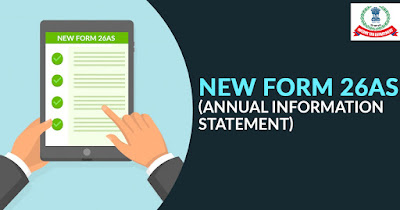The Central Board of Direct Taxes (CBDT) has recently introduced some new changes in form 26AS. The move is said to bring more transparency between the assessments and the department. Form 26AS or the Annual Information Statement is a form showing all the high paying transactions. Now, the department will also get the information about the high-paying transactions from the financial institutions, apart from that filled by the assessee.
New Form 26AS
Form 26AS is a type of consolidated annual tax statement which includes information about tax deducted/collected at source, advance tax, self-assessment which is can be found with the income tax department against the PAN number of the assessee. During the declaration of Budget 2021, the government had introduced some changes to the form making it even more transparent. The new form will be applicable from 1st June 2020. Now the form will reflect the information about the high-paying transactions which were previously listed under Statement of Financial Transactions (SFTs).
The board informed that the details of transactions like credit card bills, sale/purchase of property, purchase of shares, debentures and other securities, cash payments, etc.
Were provided to the department by the "special assess" through Statement of Financial Transactions (SFTs) as submitted by financial institutions, mutual fund houses, agencies, and other financial institutions, but now form 26AS will reflect such transactions. The assessees are required to show the transactions under SFTs as per Section 285BA of the Income-tax Act to the specific institutions. All such financial institutions record the transactions amounting more than Rs. 10 lakh, cash payments of more than Rs. 1 lakh, and payments of credit card bills of more than Rs. 10 lakhs during any financial year. Sale or purchase of securities above Rs. 10 lakhs and sale of property receipts of more than Rs. 30 lakhs are also required to be recorded.
Conclusion
The next focus of the government is the auto filing of financial transactions in the Income Tax Returns (ITRs). Form 26AS will reflect the above-stated transactions and the assessee will be able to see the approximate amount of tax according to the tax rate applicable.
"As we go further, all information will be collected and given in one place. As a common taxpayer, any economic activity which results in any profit, if it’s available in one place, then it will stay in my mind during return filing. It’s like a tick box, one can keep ticking this is correct or this is incorrect and needs to be changed. It will facilitate the correct filing of return and when the correct filing is done, correct taxes get paid. And once the correct taxes are paid, where is the question of any scrutiny. Scrutiny will only come for the mismatch. And if it comes as well, so then it can be explained in this manner. This will also result in lesser litigation since disputes will be reduced," said CBDT Chairman PC Mody.
During the last year’s budget declarations, Finance minister Nirmala Sitharaman had also announced that the government is trying to develop an auto filing system for ITR in which income from a business, house property, other sources, deductions, exemptions, etc. will be automatically recorded, making it easier for the assessees to file Income Tax Returns (ITR). the ITR will automatically record transactions related to EPFO, mutuals funds, Income, securities, TDS and numerous other sources.


Comments
Post a Comment